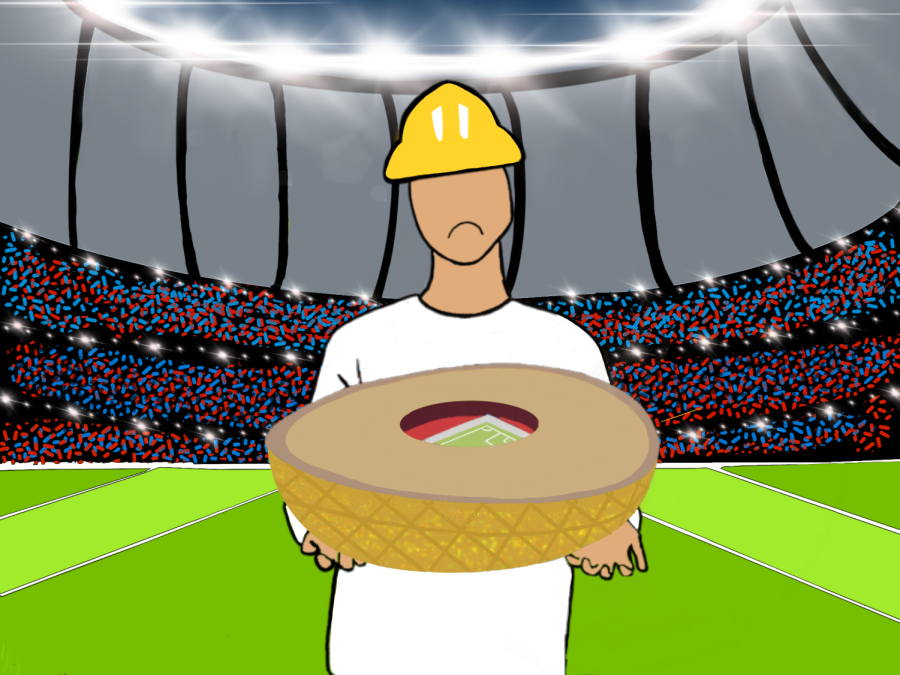The dark truth behind the 2022 Qatar World Cup
Graphic illustration by Inaaya Yousuf
Fans should be more aware of FIFA’s underhanded corruption and Qatar’s mistreatment of many groups.
December 12, 2022
As the ball brushes past the goalkeeper’s fingertips and curls into the back of the net, cheers erupt across the stadium as supporters celebrate together with their country’s soccer team, inciting patriotism and joy. This magical moment is unique only to the FIFA World Cup, a quadrennial soccer tournament in which countries compete for the title of the world’s best soccer team. However, the increasing public awareness of FIFA’s underhanded corruption and the mistreatment of several groups in Qatar overshadows the credibility of this tournament.
For decades, FIFA’s executive committee, commonly referred to as Exco, was the main decision-making body who decided each subsequent host country for the World Cup. It consisted of 24 officials including major leaders and senior officials like the president. To be eligible to host the World Cup, countries need to win a majority of votes from the members of Exco. Countries desire to host the World Cup not only because of the tournament’s prestige but also because it boosts their economic growth. However, the lack of set checks and balances in FIFA’s host-country-deciding system inevitably led to corruption: the media discovered that four Exco members were bribed in the decision for Germany to hold the 2006 World Cup, and similarly two were bribed for South Africa to hold the 2010 World Cup.
In 2010, Qatar entered the bid to host the 2022 World Cup. Qatar reportedly bribed four Exco members with up to $5 million to ensure that they would receive the majority of votes that would allow them to host the World Cup. They proceeded to invest over $200 billion in infrastructure, an unthinkable sum of money compared to the meager $3 billion that South Africa invested.
“I feel like from this year’s World Cup, people have become more aware of the corruption in FIFA that has been going on for a very long time,” senior Stefano Pinna Segovia said. “It’s now gotten into the deep end, and FIFA is now open to hosting the World Cup in North Korea in the future.”
Qatar is also considered a controversial location to host the World Cup because of constant allegations of human rights violations. Qatar has become one of the richest countries in the world after their discovery of nearby oil rigs and natural gas reserves in the late 1900s. To rapidly execute huge infrastructure plans, Qatar relies on a constant supply of migrant workers who now represent 80% of the country’s population. The process of recruiting these workers showcases the unethical side of Qatar; workers are required to pay illegal recruitment fees upfront, as well as medical tests, passports, flights and a visa to receive their job contract, causing them to fall deeper into debt. Once these workers enter the country, they find that they do not get the promised job and salary and are forced into the kafala system — a restrictive immigration system that ties the migrant workers’ immigration status to their employer. The employer sponsors the worker, granting themselves an unreasonable amount of control over workers. The kafala system is the primary reason that Qatar can exploit workers and violate their human rights.
Employers are able to control the time employees get off work, their job contract statuses and even whether they can leave the country by confiscating passports. Because Qatar promised to build 12 commendable stadiums within 12 years, hundreds of thousands of workers were recruited to execute the plan. Thousands became construction workers, where many faced atrocities ranging from verbal abuse to work-related deaths on site. Workers were also forced to live in overcrowded rooms in unsanitary conditions. Migrant workers were given the most dangerous jobs and were forced to work for 14 hours a day in the grueling desert heat.
“If you look at reports, the majority of those who died and had a working visa had no autopsy done,” history teacher Nhat Nguyen said. “The deaths are instead reported as being due to ‘natural causes,’ which is unusual as it is extremely suspicious for many young, healthy people to suddenly die.”
In 2020, Qatar finally enforced a minimum wage for employers to pay their workers and gave workers the right to terminate their job contract. However, the damage to the migrant workers’ lives had already been done, as the new laws were implemented ten years after the beginning of construction.
Qatar’s hostility toward homosexuality has also incited controversy among fans. The country considers homosexuality illegal, causing LGBTQ+ fans to feel unsafe and cautious entering Qatar in support of their country. Repeated instances of beatings and sexual harassment against LGBTQ+ groups have been reported in Qatar, causing distress for the community.
Captains from countries such as England and Germany had planned on wearing the “OneLove” armband to convey a message against discrimination of any kind, particularly against LGBTQ+ communities. However, FIFA decided that wearing this armband would result in a yellow card given to the captain, putting the whole team at a disadvantage. Furthermore, FIFA decided to ban Belgium’s away jersey because it featured the word “Love” with a rainbow-patterned trim on the shirt, which would cause potential conflict between FIFA and Qatar.
Some other unconventional bans enforced by FIFA include bans against partying and drinking in Qatar. FIFA’s last-minute decision to ban the selling of alcohol in stadiums fully highlights the extent of which they are willing to cater to the demands of the host country, rather than their fans. Nevertheless, it is understandable that one must respect culture and religion when entering a foreign country.
“It is their country, so people should respect their religion,” Nguyen said. “For example, prior to going into somebody’s house, you need to know and follow what kind of etiquette they expect you to have.”
However, many fans will continue to watch the World Cup unaware of the controversies surrounding FIFA and Qatar. The ignorance and lack of coverage of the atrocities behind-the-scenes ultimately keeps FIFA in power, which will allow for future atrocities. The best course of action is to spread awareness of these atrocities and help fans realize the potential consequences of hosting the World Cup in authoritarian countries.
“I agree that the World Cup is a joyous event that demonstrates the extent of human capabilities and provides excellent entertainment to fans,” Nguyen said. “However, it is important for people to realize that the two to three weeks of fun comes with years of abuse as well as human cost. We should try to push for changes so that we can enjoy it without feeling ashamed of how it came to be.”


































































